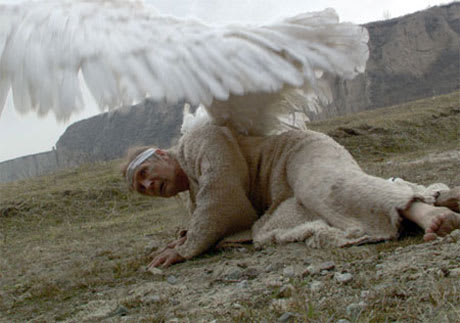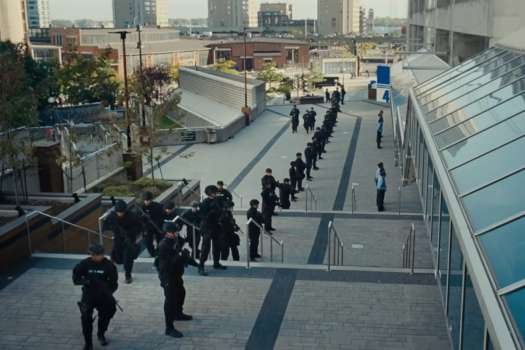Based loosely on the short story A Very Old Man With Enormous Wings by Gabriel Garcia-Marquez, Wind Man utilizes the central plot device of a seeming angel falling from the sky into a rural community, dropping the implicit satire on greed and kindness in favour of allegorical implications of Post-Soviet corruption in Kazakhstan. The result is a uniquely magical realist parable loaded with religious and cultural referents but also a reductionist surface narrative that blindly extols the common man while denigrating the sovereign. It's competent and clever but forgettable and adequate.
After Almat (Kuyandyk Kystykbaev) discovers a passive and frail old man with wings (Igor Yaslovich) in his shed following a freak electrical storm, the oddity becomes the object of much discussion amongst the locals, religious leaders and government officials. Domulla (Erdolat Ospankulov), a Koranic scholar, believes the man is an angel, while the village mullah (Bekhzan Turys) believes the man's inability to understand Allah's language implies that he is a demon.
Eventually, the very representation of the fat capitalist - an obese bald man in a white suit (Farkhad Abdraimov) - comes to examine the oddity and pass judgment, having a perspective outweighing the opinions of the locals and their Gods. When he deems the being worthless, unable to find a fiscal benefit, local officials instruct the community denizens to ban the anomaly from their village.
It's all about the exploitation of the humble Kazakh people and how government greed and incompetence is killing their way of life. Some of the information is anachronistic, adding to the heightened magical aspect of the film, while the deliberate presentation of flat, linear camera-work further suggests a grounded or trapped feeling. Even the winged man struggles to fly, repeatedly falling from the air.
An understanding of the medium, in structure, aesthetic and tonality, makes Wind Man far more accessible than other regionally and thematically similar films of late, which often adopt a handheld docudrama approach that overestimates audience appreciation for gravel and animal birthing.
Anyone curious about political and religious change in rural Kazakhstan may find appeal in the fairy tale allegory, while others will likely just find the entire ordeal somewhat unpleasant and confusing.
(Vagrant)After Almat (Kuyandyk Kystykbaev) discovers a passive and frail old man with wings (Igor Yaslovich) in his shed following a freak electrical storm, the oddity becomes the object of much discussion amongst the locals, religious leaders and government officials. Domulla (Erdolat Ospankulov), a Koranic scholar, believes the man is an angel, while the village mullah (Bekhzan Turys) believes the man's inability to understand Allah's language implies that he is a demon.
Eventually, the very representation of the fat capitalist - an obese bald man in a white suit (Farkhad Abdraimov) - comes to examine the oddity and pass judgment, having a perspective outweighing the opinions of the locals and their Gods. When he deems the being worthless, unable to find a fiscal benefit, local officials instruct the community denizens to ban the anomaly from their village.
It's all about the exploitation of the humble Kazakh people and how government greed and incompetence is killing their way of life. Some of the information is anachronistic, adding to the heightened magical aspect of the film, while the deliberate presentation of flat, linear camera-work further suggests a grounded or trapped feeling. Even the winged man struggles to fly, repeatedly falling from the air.
An understanding of the medium, in structure, aesthetic and tonality, makes Wind Man far more accessible than other regionally and thematically similar films of late, which often adopt a handheld docudrama approach that overestimates audience appreciation for gravel and animal birthing.
Anyone curious about political and religious change in rural Kazakhstan may find appeal in the fairy tale allegory, while others will likely just find the entire ordeal somewhat unpleasant and confusing.




